This post may contain affiliate links. See our disclosure policy.
I love this “cheater” way of making shoyu ramen. It takes minutes to make instead of hours or days and tastes just as delicious!
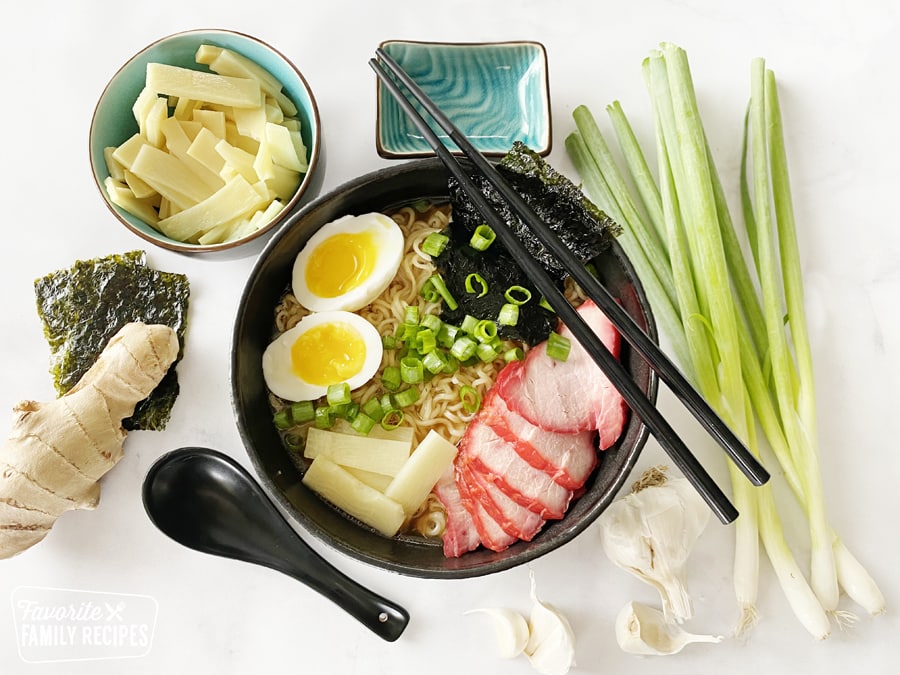
Featured with this recipe
This shoyu ramen recipe is a quick and easy way to get your ramen fix without spending hours (even days) preparing. I don’t claim that this recipe is super authentic but I will claim that it is delicious and pretty darn close to shoyu ramen bowls that I have tried at various restaurants. When it comes to the broth, I used a simpler way but it saves loads of time and still tastes great!
I love how easy it is to make these bowls look impressive. They are fairly inexpensive to put together, yet they can be dressed up to look gourmet. Impress your friends and family with this authentic meal that everyone will love. It is light and tasty in every bite!
Ingredients for Shoyu Ramen
Make this as authentic or simple as you like! These ingredients combined bring out an authentic and delicious shoyu ramen dish. It tastes incredible and each bite has its own flavor and texture when adding in protein and veggies!
- Sesame oil – This has a nutty and earthy taste to it that is famous in the Japanese ingredient list. It is very distinct and smells amazingly delicious mixed together.
- Garlic – Every recipe needs a little garlic in it!
- Ginger – Freshly grated ginger is added in and brings out all the authentic flavors.
- Ramen broth – Make your ramen broth or buy it store-bought. This is an easy ingredient that adds the most flavor since the ramen will be soaking in the juice.
- Soy sauce – A little salty flavoring but every dish needs a splash of Japanese soy sauce to complete their meal. It is the perfect blend and has just the right amount of flavor. It also adds color to the liquid mixture.
- Ramen – Dry ramen or chukamen noodles work well in this authentic dish.
- Ramen topping – Precooked your favorite type of protein or veggies to add in to the ramen. We always love pork belly, seaweed,
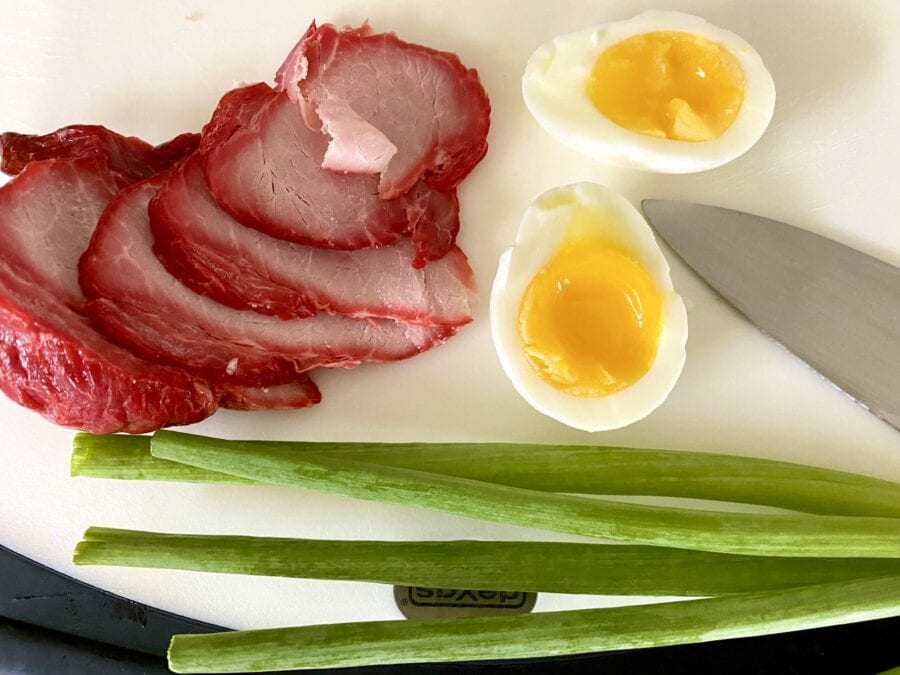
How to Make Easy Shoyu Ramen
The shoyu ramen is a delicious combination and slightly on the healthy side. Each ingredient is whole and good for you and is served with love. Create the best dish that your family will love to eat year-round!
- Simmer – Sauté garlic and ginger in sesame oil in a large pot over medium-high heat or until fragrant. Add ramen broth and soy sauce and simmer for 5-10 minutes.
- Strain – Pour broth through a fine mesh strainer into a large liquid measuring cup or bowl to remove garlic and ginger bits. Pour broth back into the saucepan and discard garlic/ginger pieces. Keep broth at a low simmer until ready to serve.
- Cook – Prepare ramen or chukamen noodles according to package directions (discard flavor packets if any). Drain noodles and set aside. Prepare your desired toppings.
- Serve – Place broth in individual bowls and divide noodles between the bowls. Top with your favorite protein and vegetable toppings and serve.
What type of Noodles
The noodle can honestly come down to preference. If you want to go fancier, you can opt for a fresh noodle from your local Asian market. These dried Japanese ramen noodles are great authentic noodles commonly used in shoyu ramen bowls at restaurants.
- Ramen noodles – A basic ramen noodle can either be fresh ramen noodles or dried and varies in texture from curly to straight. Using Top Ramen dried noodles works too!
- Chuckamen – This is the most common type of noodle for shoyu ramen bowls. The noodle is straight and thin with a chewy texture.
- Hosomen – These are thinner than chuckamen noodles. They are a lighter noodle type and cook very quickly.
- Hakata-style – Thin and straight noodles without any curls in them. Hakata has a firm texture and is cooked like an Italian pasta, al la dente.
- Medium-thick – Try a thicker noodle that is hearty and has more flavor.
- Egg noodles – These noodles are made out of eggs, kansui, and wheat flour and usually have a spiral to them. They are richer and more flavorful than most noodles.
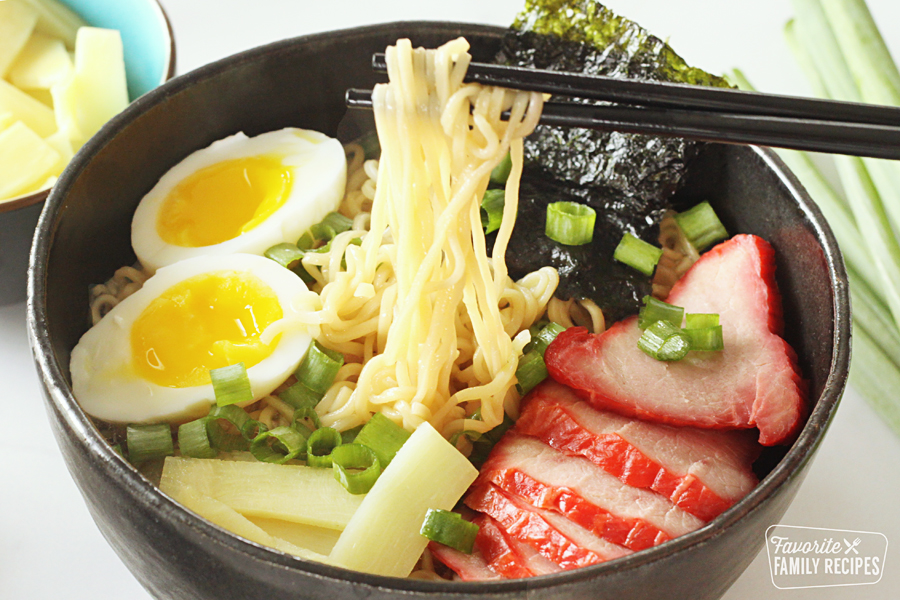
Importance of Broth
The broth can vary from a very simple soup base to a broth infused with a variety of intense flavor combinations that can take days to prepare. For this recipe, I simply used a ramen broth that I found at the grocery store. You can find this kind of broth either near the other soup bases/broths or near the Asian foods section. It’s nothing fancy but it is good enough to satisfy your ramen craving.
There were several different kinds of ramen broths to choose from at my grocery store so I suggest trying a few different kinds and choosing your favorite. If you can’t find ramen broth, you can also use equal amounts of chicken stock or broth and prepare dashi stock.
Add in Protein
More often than not, shoyu ramen will include some kind of protein. Pork, chicken, shrimp, tofu, soft-boiled eggs, sardines, and narutomaki (fish cakes) are probably the most common proteins found in shoyu ramen bowls but you can also use beef, fish, and shell-fish such as crab or lobster.
You can use one or multiple proteins to make it just how you prefer. For this recipe, I used char siu also known as barbecued pork loin because I just love the flavor. It’s not considered “traditional” but it’s my favorite thing to use and egg boils for another protein idea.
Vegetables are a Must
When it comes to vegetables, the sky’s the limit. Vegetables for these ramen bowls can include but are not limited to green onions, julienned carrots, bean sprouts, bamboo shoots, snow peas, bell peppers, Nori, kelp, mushrooms, scallions, and/or corn. You can also top it off with some furikake (seasoned sesame seeds with nori) and/or a little hoisin for flavor.
- Green onions – Adds a fresh onion flavor. Sliced green onions float to the top giving the shoyu ramen texture and depth to the dish.
- Bok choy – This is leafy greens like spinach that add a lighter side to the ramen.
- Bean sprouts – These are light and crunchy. They add a fun Asian vibe to the dish!
- Corn – Use corn kernels from sweet corn. It is an extra sweetness and a great balance of flavors with this corn.
- Mushrooms – A thin and chewy texture is added to the ramen. Shiitake mushrooms are savory and filling when they absorb the flavors of the shoyu ramen.
- Carrots – Slice and cut up carrots to soak in the broth and become flavorful.
“This homemade ramen recipe is so easy to make and it was my first time. I will definitely be making this again especially during the Fall and Winter! Thank you!”
-Kathryn

Questions About Shoyu Ramen
Shoyu ramen is a delicious Japanese noodle bowl with a savory broth made with shoyu (aka soy sauce). It is popular in Japan, and Hawaii, and becoming more popular in the mainland U.S. It is a beautiful dish that can be made in about a million different ways.
Honestly, you can make shoyu ramen as basic or as over-the-top as you would like. There can be any number of ingredients you can use, however, shoyu ramen typically have 3-4 components, including:
Tonkotsu is pork bone broth. Shoyu is more of a soy sauce-based ramen.
Shoyu is the Japanese word for soy sauce. Shoyu ramen means soy sauce-flavored ramen. Miso ramen on the other hand is miso-flavored ramen.
Fresh ramen noodles tend to be softer, are more chewy in texture, because of their high water content whereas dried ramen noodles are dehydrated and usually packaged last longer on the shelf.
Fresh ramen noodles don’t take as long since they take less time to cook. Boil your water and cook the noodles for one to four minutes. Watch so you don’t over cook the fresh noodles. They will turn mushy.
Storing Leftovers
Place any leftover shoyu ramen in the refrigerator. When ready to reheat, place the leftover shoyu ramen in a pot on the stovetop until it is heated through. Add in veggies and seasonings to add to the flavoring.
More Easy Noodle Bowl Recipes
Noodle dishes are filling, easy to make, and add flavor to any protein and/or vegetable. Kids to adults love noodles and the versatility they have in every dish. These recipes are our favorite and so easy to make!
How to Make Shoyu Ramen
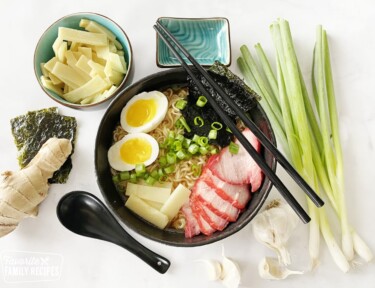
Cheater Shoyu Ramen
Video
Ingredients
- 1 teaspoon sesame oil
- 2 teaspoons garlic (minced)
- 2 teaspoons fresh grated ginger
- 2 cups ramen broth (found near the other soup bases/broths at the grocery store, see notes above)
- 1 Tablespoon soy sauce
- 6 ounces dry ramen or chukamen noodles (2 3-ounce packages, see notes above)
- ramen toppings (see notes above)
Instructions
- Sauté garlic and ginger in sesame oil in a large saucepan until fragrant. Add ramen broth and soy sauce and simmer for 5 to 10 minutes.
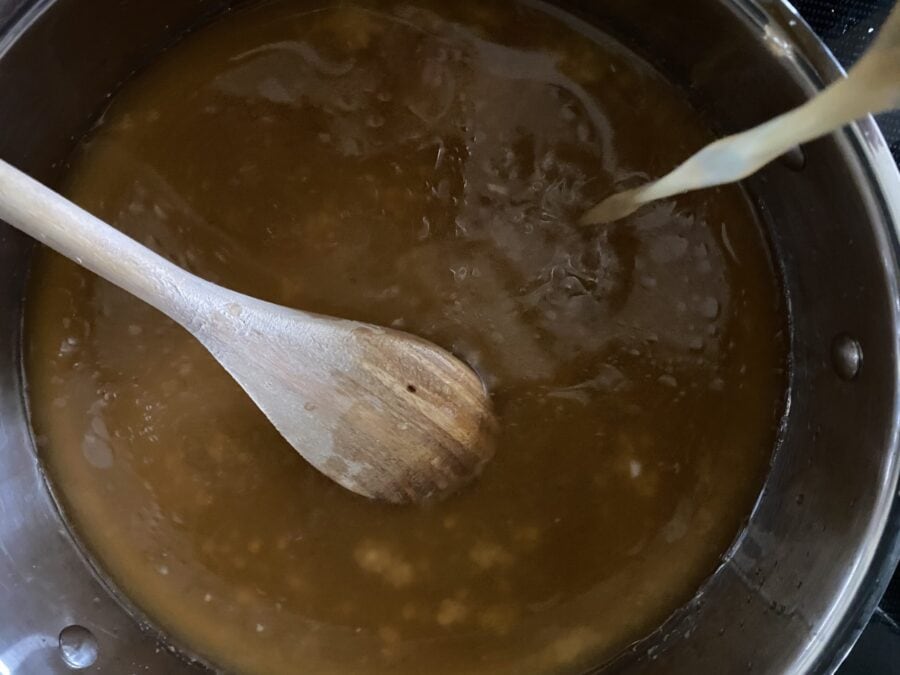
- Strain broth through a fine mesh strainer into a large liquid measuring cup or bowl to remove garlic and ginger bits. Pour broth back into the saucepan and discard garlic/ginger pieces. Keep broth at a low simmer until ready to serve.
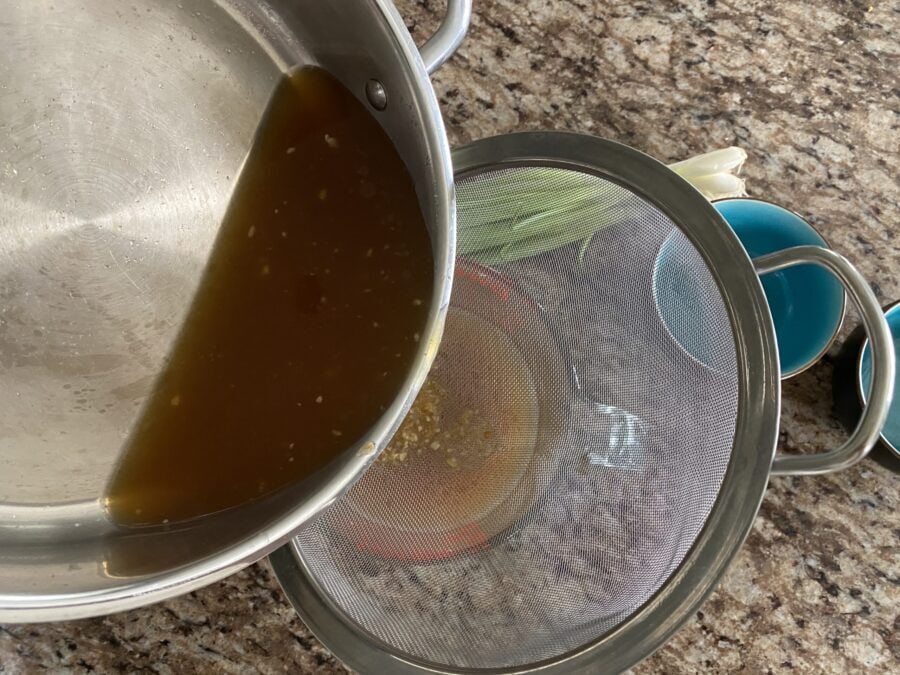
- Prepare ramen or chukamen noodles according to package directions (discard flavor packets if any). Drain noodles and set aside. Prepare your desired toppings (see above for ideas).

- Place broth in individual bowls and divide noodles between the bowls. Top with your favorite protein and vegetable toppings and serve.

Notes
Protein Ideas:
- pork
- chicken
- shrimp
- tofu
- soft-boiled eggs
- sardines
- narutomaki (fish cakes)
- char siu – also known as barbecued pork loin
Vegetable Ideas:
- green onions
- julienned carrots
- bean sprouts
- bamboo shoots
- snow peas
- bell peppers
- Nori
- kelp
- mushrooms
- scallions
- corn
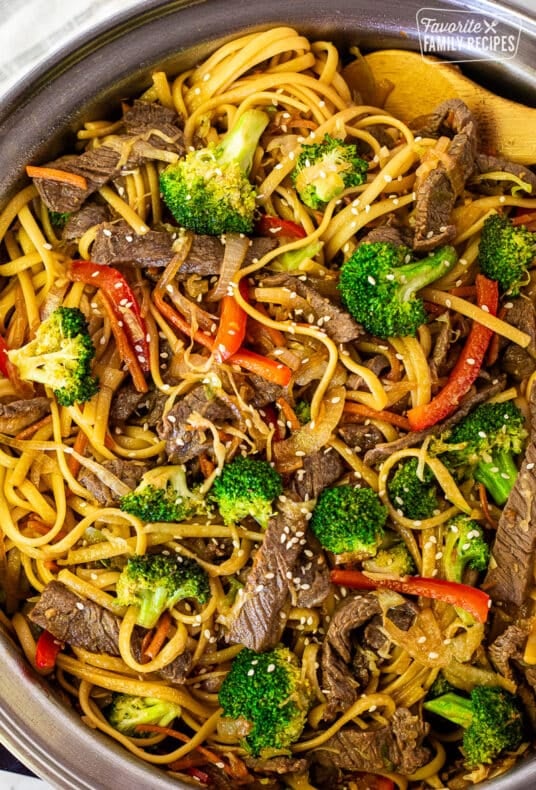
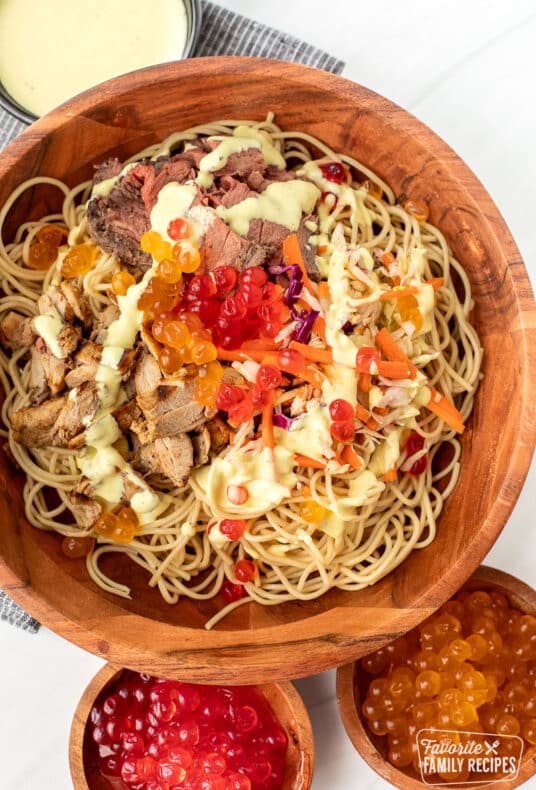
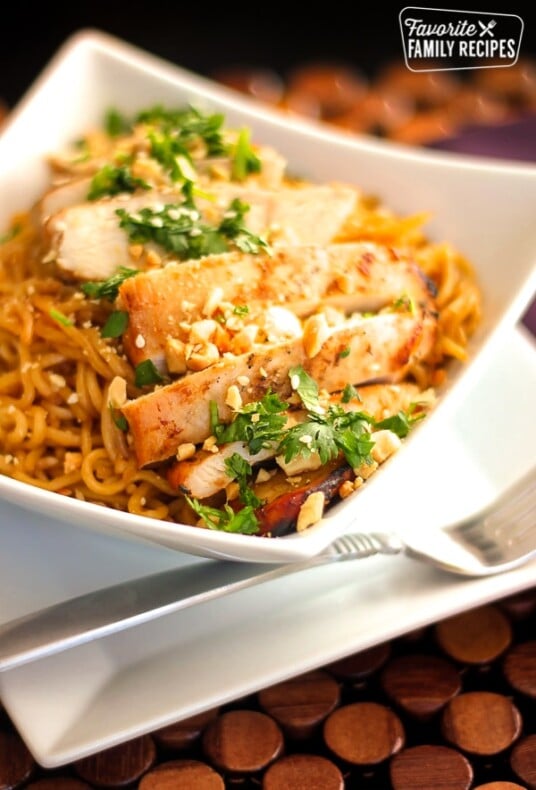
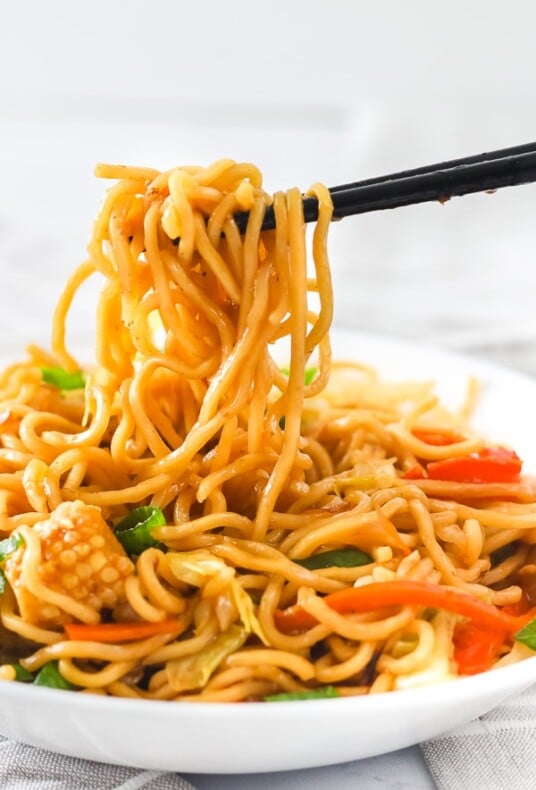
Looks incredible! Can’t wait to make this ramen! Yum!
I just love this cheater version 🙂 I’m a huge ramen fan but would never make it because it seems so difficult. With your cheater version, I’ll definitely give it a try at home. Thanks for the easy alternatives.
This homemade ramen recipe is so easy to make and it was my first time. I will definitely be making this again especially during the Fall and Winter! Thank you!
We all love ramen and this recipe is amazingly easy to put together!
This is such a delicious recipe! Can’t wait to try it!